Posts Tagged ‘Entrepreneur’
197 Embrace The Suck w/ Navy SEAL Brent Gleeson
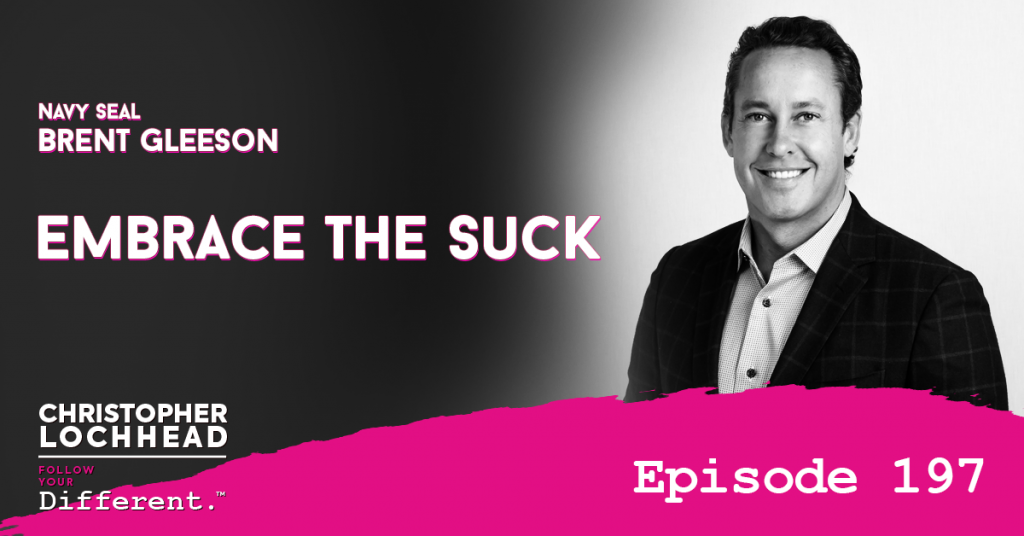
Podcast: Play in new window | Download (Duration: 1:05:36 — 45.0MB) | Embed
Subscribe: Apple Podcasts | Spotify | Pandora | RSS | More
In today’s episode, we have legendary combat veteran Navy seal Brent Gleason. He’s got a red, hot, rocking, new book out called Embrace The Suck. Brent is a successful entrepreneur, author and speaker and his new book is catching everybody’s attention. Today, we get into why Brent thinks we need to lean into pain, how to deal with failure and rise up to any challenge, no matter what.
Leading Through Change
Brent gives us an inside look on what it was like as a legendary combat veteran Navy seal. Moreover, he shares his perspective on the pandemic and what he thinks leaders should be doing. He thinks organizations should reevaluate the needs of its people based on a lot of factors.
“The global pandemic has caused an even heightened level of leadership, complexity, and challenge. As leaders, we’re supposed to show empathy and be innately in tune with what motivates each individual on our team, within our direct reports and our peers. Now with everybody working predominantly in a remote setting, everybody has a different environment that they’re now in. In addition, some people thrive in remote settings and others feel isolation and uncertainty. Greater levels of digital silos are now creating communication challenges. Obviously your organization is going to go through a lot of change.” – Brent Gleeson
Leaning Into The Pain
In his book, he shares psychological, emotional, and physical pain and suffering and how various people deal with pain. There is a purposeful suffering that everyone must engage in to achieve loftier goals and causes greater than ourselves. These will serve to develop individuals in expanding the boundaries of one’s comfort zone. In turn, lead to a more fulfilling, happier, and purpose-driven life.
“When have you ever achieved anything meaningful in your life that did not have something attached to it? Like some level of pain, suffering, or adversity. The answer is nothing. When have you ever done something that gave you true fulfillment that was trapped within the confines of your comfort zone? Nothing. It’s only when we peak beyond the boundaries of the comfort zone and see what’s out there. That is what expands your comfort zone and moves the goalposts. You make it a ritual part of your existence and part of your mindset.” – Brent Gleeson
Taming The Tiger
Brent discusses how in life there are choices down the road that lead you to temptation. He shares how one can tame the tiger and resist temptation. In life, humans are inevitably tempted and human centered, the goal is to mend the relationships or goals one is focusing on.
He shares how it ultimately comes down to the philosophy of simply limiting choices and creating an environment that supports your objective. He discusses how one should set themselves up for success by being purposeful in the environment and what one creates. Lessening the opportunity to be distracted or tempted by things that do not align with the actions necessary to achieve the desired outcome.
“In order to tame my tiger, I had to transform my entire lifestyle and mindsets to limit the choices. I removed every possible element of temptation from my life that would stand in the way of the goals I had made. So my social life, my dietary habits, workout regimen, even going as far as removing people from my life that I knew would stand in the way of achieving that goal. If I wanted to achieve my goal, all that stuff had to go.” – Brent Gleeson
To know more about the legendary Brent Gleeson, his new book and his incredible life journey. Download and listen to this episode.
Bio:
Brent Gleeson was a member of SEAL Team 5, some of the first SEALs deployed to Iraq in early 2003. He completed combat deployments in Iraq, Africa, and other theaters of war.
After returning to civilian life, Brent earned an MBA and has built award-winning, multi-million dollar organizations that have repeatedly landed on the Inc. 500 list of fastest growing private companies.
He is the author of TakingPoint and has starred in several reality shows including Mark Burnett’s ‘Stars Earn Stripes.’
Links:
Taking Point Leadership – Books
We hope you enjoyed this episode of Follow Your Different™! Christopher loves hearing from his listeners. Feel free to email him, connect on Facebook, Twitter, Instagram, and subscribe on iTunes!
192 How Heroes Fight Wildfires w/ CAL FIRE Chief Jonathan Cox & ZoneHaven CEO Charlie Crocker
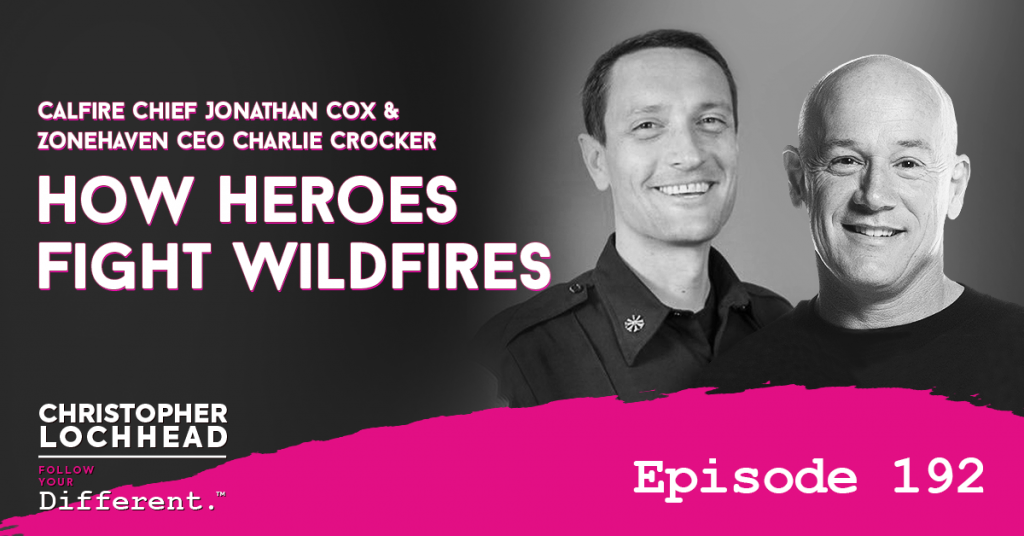
Podcast: Play in new window | Download (Duration: 1:20:51 — 55.5MB) | Embed
Subscribe: Apple Podcasts | Spotify | Pandora | RSS | More
In this episode, a truly legendary conversation with two extraordinary men, men who are on a mission to stop deadly wildfires. First, we have Charlie Croker, the founder and CEO of Zone Haven. Zone Haven is using data to everything technologies, to help government agencies and citizens both plan for and respond to serious disasters.
Our second guest is Chief Jonathan Cox, CalFire Executive who is responsible for fire operations in this region.
Together, Charlie and Jonathan share how firefighting heroes stop these fires and save countless lives and billions in property.
A Night Californians Will Never Forget
The night of Saturday, August 15 2020, a massive lightning storm hit the region. Approximately 12,000 strikes of lightning hit Northern California which caused massive fires. The wildfire lasted for weeks and it destroyed almost 10,000 buildings along with the big basin redwoods State Park, and took the life of one person.
“It was a horrifying fire and it started eating the mountainous area that has a lot of underbrush, some of the most beautiful ancient redwoods, and a lot of wonderful homes, towns and businesses.” – Christopher Lochhead
The Worst Fire Season In History
Chief Jonathan Cox recounted to Chris how they had expected the worst for the wildfire season. However, they did not expect this horrible incident to have grown into that magnitude. He further explained their process and prioritization and how technology from Zone Haven has contributed a lot to their firefighting efforts.
“We’re very good when there’s one or two large fires burning, getting an incident management team assembled and getting resources drawn throughout the system. But this really was one of those moments where you had concurrent major emergencies happening in a small geographical area, really in the Bay Area, and a little bit north, and it really turned into a prioritization of resources based on the threat to humans and the threat to structures.” – Chief Jonathan Cox
Saving Lives and Properties
Charlie Crocker, from Zone Haven shares the technology as it relates to helping CalFire make sound decisions during that emergency. He further shares in this episode how their communication strategy, along with the CalFire executives, were in sync and were out of the box, that it made drastic results in terms of preventing more damages.
“The main focus of it and why we’re called Zone Haven is that we really focus on very small neighborhoods or zones. So these zones are smart. They know the number of people, they know how quick, how long it’s going to take for people to get out of there.” – Charlie Crocker
To know more about How Heroes Fight Wildfires and for more information about CAL FIRE Chief Jonathan Cox & ZoneHaven CEO Charlie Crocker, download and listen to this episode.
Bio:
CAL FIRE Deputy Chief Jonathan Cox
CalFire Deputy Fire Chief Jonathan Cox oversees fire operations at the San Mateo County Division of CAL FIRE, which includes San Mateo County Fire Department and Coastside Fire Protection District.
His passion for the fire service started young, prior to his current role he worked both municipal and wildland fire field operations with CAL FIRE at Coastside Fire District, San Mateo County Fire Department and San Luis Obispo County Fire Department.
In addition, he spent several years as the Northern California spokesperson for CAL FIRE. Jonathan was also a founding member for CAL FIRE’s land use planning program at the Office of the State Fire Marshal (OSFM), working with local jurisdictions to make informed land use decisions related to the threat of wildfire.
Jonathan also responds to, and manages, some of California’s largest disasters. He spent five years as a member of CAL FIRE’s Incident Management Team 6 (FEMA Type 1), where he served on the command staff in the capacity of Public Information Officer (PIO1).
He holds a Bachelors Degree from Cal Poly, San Luis Obispo and a Masters Degree from the University of Copenhagen, Denmark.
He has also completed an intensive training at the United Nations Institute for Training and Research (UNITAR) in Geneva, Switzerland.
Jonathan is a State of California (OSFM) certified Chief Officer and Registered Instructor.
Additionally, Jonathan is an emergency response educator and trainer in the field of emergency management and crisis communications.
He has been a subject matter expert speaker at numerous conferences, including the National Fire Protection Association. His work has spanned five countries and involved working with hundreds of professionals.
He has lived in the US, Denmark and the United Kingdom.
Charlie Crocker, Founder/CEO Zonehaven
Charlie is the Co-Founder and CEO of Zonehaven Inc.
He is a data geek and entrepreneur with more than 25 years of experience building teams to bring data out of the shadows and drive business value.
Prior to Zonehaven, he built Autodesk’s first big data platform team to support migration to subscription and the cloud. He also led product management for Autodesk’s flagship AutoCAD product line.
Prior to Autodesk he was co-founder in a start-up focused on spatial databases and web-based tools for state and local government agencies and utility companies.
Charlie has a passion for growing young leaders.
He mentors MBA and MSBA students at UC Davis and California College of the Arts.
Links:
DONATIONS: CZU Lightning Complex fire: Give help, get help
Linkedin: Chief Cox
Twitter: @firechiefcox
Website: ZoneHaven.com
Linkedin: Charlie Crocker
We hope you enjoyed this episode of Follow Your Different™! Christopher loves hearing from his listeners. Feel free to email him, connect on Facebook, Twitter, Instagram, and subscribe on iTunes!
175 The Startup Community Way w/ Brad Feld
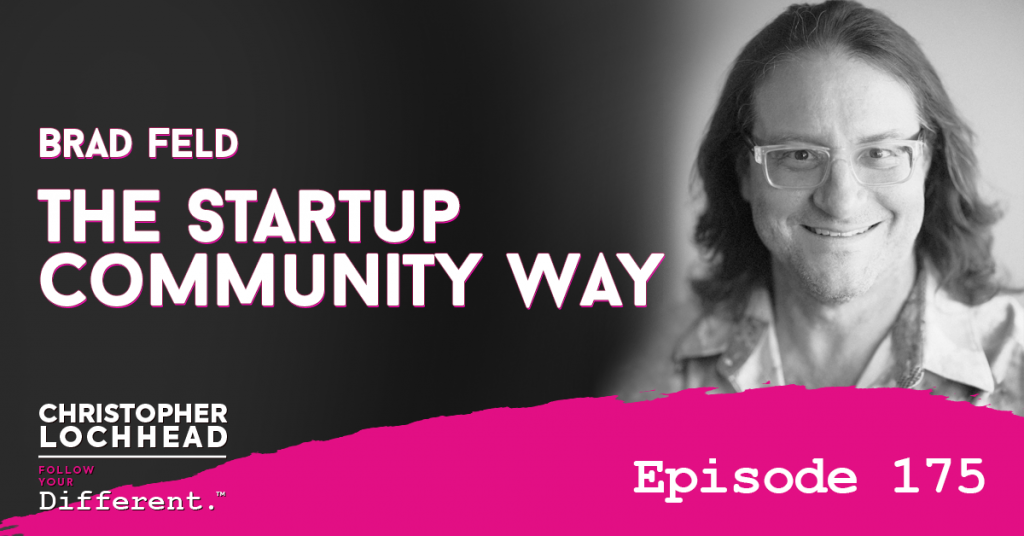
Podcast: Play in new window | Download (Duration: 1:10:44 — 48.6MB) | Embed
Subscribe: Apple Podcasts | Spotify | Pandora | RSS | More
Today, we continue our run on top venture capitalists with none other than the legend, Brad Feld. He’s the co-founder of Foundry Group and Tech Stars. He’s on the Forbes Midas List and a Top Five Investor. He has a new book called The Startup Community Way.
We have wide-ranging conversations from C19, making sense of this time of hyper change complex adaptive systems, the future of startups Silicon Valley and work, and why Brad is not leaving his house. Pay special attention to Brad’s thoughts on how to deal with an unpredicted situation and where it can feel like we have a lot less control.
The Three Crises
Brad shares what’s on his mind at the moment, how he has stepped forward to help the governor of Colorado without leaving the confines of his home, and how he has pondered upon the three crises of the world today.
“I referred to the health crisis, which is COVID, which generated an economic crisis, which we wouldn’t have had otherwise, our economy was very strong, which has generated a mental health crisis and which is subsequently generated. racial equity crisis. All of these things are interacting with each other.” – Brad Feld
Complex Adaptive Systems
Brad shares how he realized that all of these crises were complex systems. In fact, in his book, The Startup Community Way, he bases the entire framework of how startup communities develop and evolve on complexity theory and the notion of complex adaptive systems.
“I’ve really been soaked in that intellectually, not just in the COVID crisis, not just in the book, not just in all the dynamics around the businesses that I’m involved in, and I’m an investor in, but just sort of thinking about how as humans, we do such a bad job of understanding how to interact with complex systems. We want everything to become deterministic, linear or well defined and the vast majority of stuff we interact with isn’t.” – Brad Feld
Simple and Complex Systems
Simple is making a coffee drink, complicated is designing a Boeing airplane, or conducting a business audit, and complex is raising a child.
“I think a lot of people have been operating against the backdrop of believing that a lot of things are deterministic and predictive, and trying to function in a way where that is not natural. As humans, we want to control stuff. You want to understand what it is you want to do, fix things so that you’re not fighting against them and you want to get to an outcome and you want to set a goal and make a goal.” – Brad Feld
To know more about Brad Feld, download and listen to this episode.
Bio:
Brad Feld is co-founder of the Foundry Group and has been an early-stage investor and entrepreneur since 1987.
Brad previously co-founded Mobius Venture Capital and Techstars, and prior to that, founded Intensity Ventures.
Feld was an early investor in Harmonix, Zynga, MakerBot, and Fitbit.
A writer and speaker on venture capital investing and entrepreneurship, Brad has written a number of books as part of the Startup Revolution series, and writes the blogs Feld Thoughts and Venture Deals.
He currently is chair of the National Center for Women & Information Technology and on the boards of Path Forward, the Kauffman Fellows, and Defy Ventures.
Brad holds a Bachelor of Science and Master of Science degrees in Management Science from MIT.
An art collector and long-distance runner, he has completed 25 marathons as part of his mission to finish a marathon in each of the 50 U.S. states. He lives in Boulder, Colorado.
Links:
The Foundry Group Team – Brad Feld
We hope you enjoyed this episode of Follow Your Different™! Christopher loves hearing from his listeners. Feel free to email him, connect on Facebook, Twitter, Instagram, and subscribe on iTunes!
168 Conscious Capitalist Navin Chaddha of Mayfield
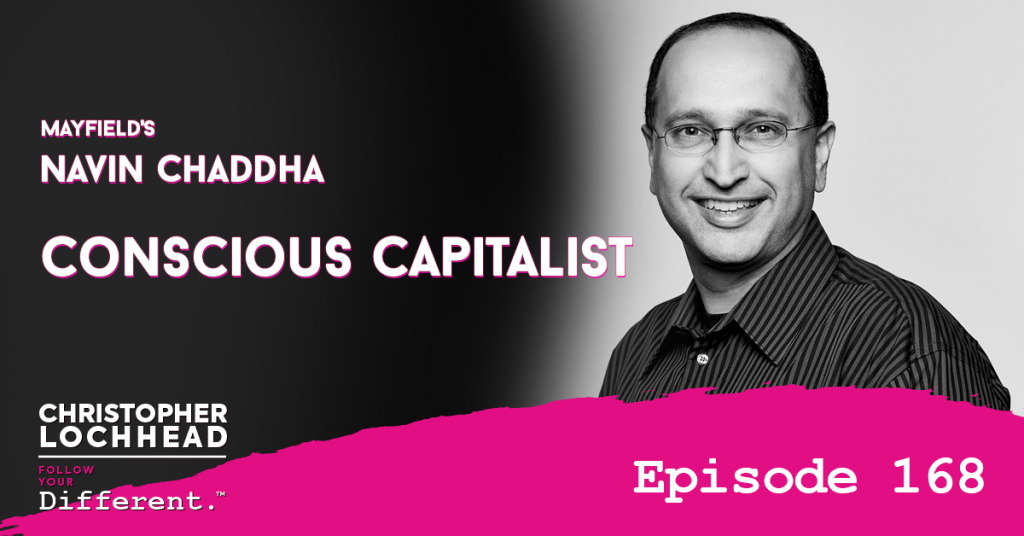
Podcast: Play in new window | Download (Duration: 1:06:16 — 45.5MB) | Embed
Subscribe: Apple Podcasts | Spotify | Pandora | RSS | More
In this episode, we continue our run of top Silicon Valley venture capitalists with Navin Chaddha, who leads Mayfield, one of the oldest and most storied venture capital firms in the Silicon Valley startup world. Navin has been on the Forbes Midas list for a long time and is a top-five investor according to Forbes.
We have a wide-ranging conversation where we deal with everything from diversity to philanthropy, Navin’s backstory, what he calls superhumans, and pay special attention to why Navin thinks that biology is a technology.
Leading a 50-Year Old Company
Navin leads the company Mayfield, which is on its 51st year of operations in 2020. He considers this opportunity as a real blessing and one that is filled with responsibility as well. He is optimistic about the future, but is wary of serious impending issues of the world such as this widespread disease and racial disparity.
“We have to ensure it’s all about people because one of the founding mottos of the firm is people make products, products don’t make people are everything. So whatever we do, we want to live by the people and do good by others, at the same time, do well as a firm and for our investors and entrepreneurs. – Navin Chaddha
Becoming A Conscious Capitalist
Navin shares how venture capital needs to change. Instead of investing money and helping entrepreneurs, Navin challenges his fellows to become conscious capitalists. Mayfield pledges to this movement, as they aim to contribute yearly 1% of their management fee and 1% of their carry, to give the opportunity to underrepresented students and entrepreneurs.
“There we take a balance of what we can do, not only financially, but what can we do for human and planetary evolution in the form of giving back some of the financial resources we have, but also giving back our time.” – Navin Chaddha
Entrepreneurship & Underrepresented Communities
Navin shares his thoughts about underrepresented communities and entrepreneurship. He encourages them to reach out to VC’s such as Mayfield, who will launch the program Access For All, with the premise of making capital available across all boards.
“It has to be done by people who want to be entrepreneurs. They need to just lean forward and make the plunge. They need to go make sure they get good mentors, whether it’s their advisors, whether it’s former entrepreneurs, whether it’s potential customers, whether it’s legal firms, or people like you, beyond venture capitalists, whom they can look upon and get some advice and I call that mentorship capital. Once they have those things in place, please come approach the venture community because we are all focused around funding innovation, and helping people achieve their dreams.” – Navin Chaddha
To hear more about Navin Chaddha and becoming a Conscious Capitalist, download and listen to this episode.
Bio:
Navin Chaddha leads Mayfield. He has ranked on the Forbes Midas List of Global Tech Investors 12 times, including being named a Top Five investor in 2020.
During his career as a venture capitalist, he has invested in over 50 companies, 17 of which have gone public and 20 have been acquired. Some of his investments include Lyft, Poshmark, SolarCity, Hashicorp, Elastica, CloudGenix, and CloudSimple.
As an entrepreneur, he has co-founded or led three startups including VXtreme, a streaming media platform, acquired by Microsoft to become Windows Media.
Navin is a committed philanthropist who directs Mayfield’s 50-year tradition of philanthropy to support many causes including diversity, health, hunger, and education.
Interests: Cricket, Bollywood.
Links:
Top VC Unveils Crisis Leadership Strategies For Entrepreneurs
We hope you enjoyed this episode of Follow Your Different™! Christopher loves hearing from his listeners. Feel free to email him, connect on Facebook, Twitter, Instagram, and subscribe on iTunes!
163 How to build a breakthrough | Mike Maples, Jr. Floodgate Capital
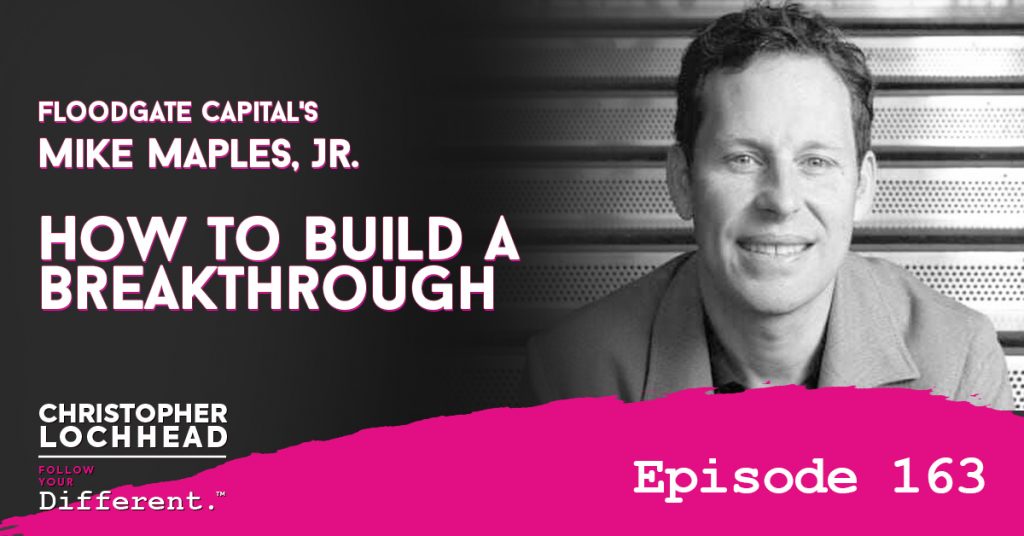
Podcast: Play in new window | Download (Duration: 1:31:07 — 62.6MB) | Embed
Subscribe: Apple Podcasts | Spotify | Pandora | RSS | More
Today, the 1st in a two-part series on entrepreneurship, we have entrepreneur, Co-Founder of FloodGate and host of “Starting Greatness” Mike Maples, Jr. He recently wrote “How to build a breakthrough: the secret of back-casting” and we’re going to go deep on it today!
Watch out for our next episode, we’re having founder/CEOs Osman Rashid. He started $8B, publicly-traded Chegg and now Convo.com.
Status of Silicon Valley
Christopher and Mike starts their discussion about the state of Silicon Valley. Both agreed that most of Silicon Valley companies are the first adopters of sheltering in place and work from home arrangements. It has definitely benefitted some companies who have adjusted early on.
However, they also Mike also describes this coronavirus pandemic as a “hand of God” who “punished” some companies and catapulted some to success.
“I’ve never really seen a situation where you have a tale of two types of businesses. Most recessions, they affect some worse than others, but they affect everybody badly to some degree. Whereas what we’re seeing in this one is: it’s almost like a lot of things that were already starting to gather, got accelerated forward — telemedicine, remote distributed work, distance learning, remote work infrastructure. So you could make the case that this has had a dramatic impact in both directions ironically.” – Mike Maples Jr.
Moving Forward By Looking Backward
Mike recently created an interesting piece about moving forward by looking backward. He mentions that the future doesn’t happen to us. It happens because of us. He further explains why he wrote the piece and how it can help entrepreneurs plan their future.
“Great founders design the future. Design is the right word. It’s not just about drawings or how things look or even how they function or perform. It’s about people with a determined idea of what a better future should be. Not only building that better future, but convincing people in the present to change the trajectory, that they’re on.” – Mike Maples Jr.
Create A Movement To Move A Market
For Mike, entrepreneurs don’t discover markets. They create movements that become markets. They move people to their point of view and they move people from the present to a better future.
“I thought it might be useful to try to help entrepreneurs get some lessons that I’d received from some of the super performers that I’ve worked with on how do you build a breakthrough. I’ve spent a lot of time over the years trying to deconstruct what they do and how it’s different from what normal startups look like. That is why I wrote this post on backcasting.” – Mike Maples Jr.
To know more about how backcasting can help you design the future that you want and for more information about Mike, download and listen to this episode.
Bio:
Mike Maples, Jr is a Partner at Floodgate. He has been on the Forbes Midas List since 2010 and was also named one of “8 Rising Stars” by FORTUNE Magazine.
Before becoming a full-time investor, Mike was involved as a founder and operating executive at back-to-back startup IPOs, including Tivoli Systems (IPO TIVS, acquired by IBM) and Motive (IPO MOTV, acquired by Alcatel-Lucent.)
Some of Mike’s investments include Twitter, Twitch.tv, ngmoco, Weebly, Chegg, Bazaarvoice, Spiceworks, Okta, and Demandforce.
Mike is known for coining the term “Thunder Lizards,” which is a metaphor derived from Godzilla that describes the tiny number of truly exceptional companies that are wildly disruptive capitalist mutations. Mike likes to think of himself as a hunter of the “atomic eggs” that beget these companies.
Interests: Calligraphy, cinematography, and sporting clays.
Links:
How to build a breakthrough, Medium
We hope you enjoyed this episode of Follow Your Different™! Christopher loves hearing from his listeners. Feel free to email him, connect on Facebook, Twitter, Instagram and subscribe on iTunes!
161 What IBM’s Experience In The Great Depression Teaches Today’s CEOs | Kevin Maney
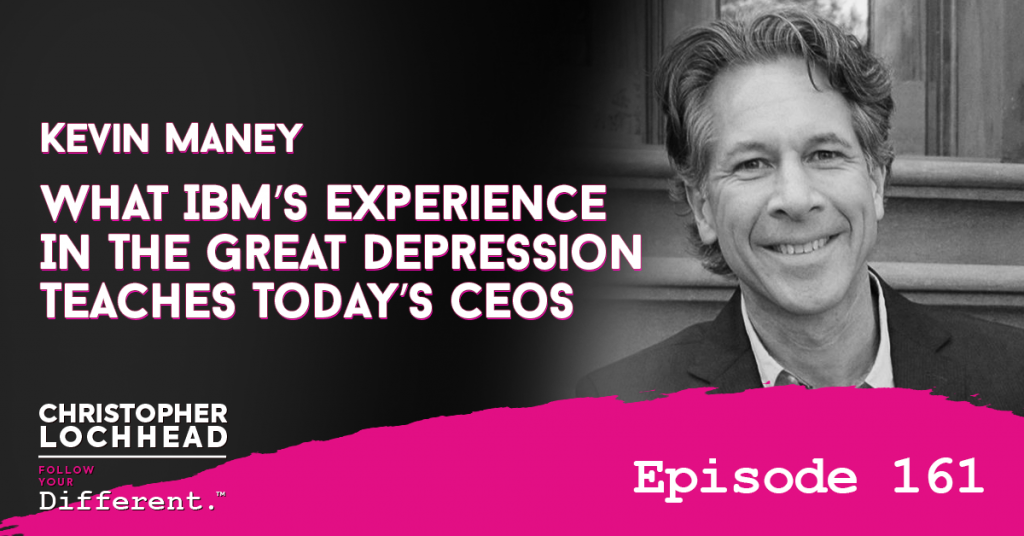
Podcast: Play in new window | Download (Duration: 40:15 — 27.6MB) | Embed
Subscribe: Apple Podcasts | Spotify | Pandora | RSS | More
Today, we continue our run of legendary authors with Kevin Maney. He’s the world’s leading authority on IBM’s history. He shares some amazing insights into what IBM did during the 1930’s that ultimately positioned them for greatness. We also have a fascinating talk about what changes C19 might bring to the world and what that could mean for our businesses and careers.
Writing About Thomas Watson
Kevin is a multi-time best selling author of Unscaled and Play Bigger. He’s also a co-founder of Category Design Advisors, where he helps companies design and dominate their market categories. Today, Kevin shares how fortunate he was to be able to write a biography of Thomas Watson, the man behind IBM.
“I have been watching what’s happening and there’s all this economic damage and talk of a long term recession or depression everybody has to get through. Seeing companies laying off people, right and left and the jobless rate going through the roof and all these pain that is being caused made me think back to IBM in the 1930s during the Great Depression.” – Kevin Mahey
IBM and The Great Depression
Kevin narrates the amazing story of how IBM took the lead during a crisis. It was just a few years after the great depression. Instead of ceasing operations just like any other major corporations, he allocated funds to manufacturing and research and development.
“Imagine the tension, there’s no revenue coming in, spending all this money keeping these people, building machines and he is running out of time. Then this amazing event happened.” – Kevin Mahey
Then-President Roosevelt devised programs to assist companies wherein the government will be needing a lot of reports on salaries. IBM, being the only capable company to fulfill this demand then stepped into the picture. This made IBM as it is now and Thomas Watson, one of the greatest CEOs of all time.
Crisis As An Opportunity Rise
Kevin shares that similar to the Great Depression crisis, this current crisis could also be an opportunity to build something up, get ahead, and come out of even stronger.
“These kinds of moments in time can be seen as a tragedy but it can also be seen as an opportunity. If you can invest in the business, be wise and be careful, come out of the other end in a better position than you went in, and everybody else around you is devastated, I mean you’re in a great place.” – Kevin Mahey
To hear more about the inspiring story of Thomas Watson, IBM as told by Kevin Mahey, download and listen to this episode.
Bio:
Links:
Book: Unscaled: How AI and a New Generation of Upstarts Are Creating the Economy of the Future
We hope you enjoyed this episode of Follow Your Different™! Christopher loves hearing from his listeners. Feel free to email him, connect on Facebook, Twitter, Instagram and subscribe on iTunes!
160 Radical Business Transformation | Clint Carnell, CEO Hydrafacial
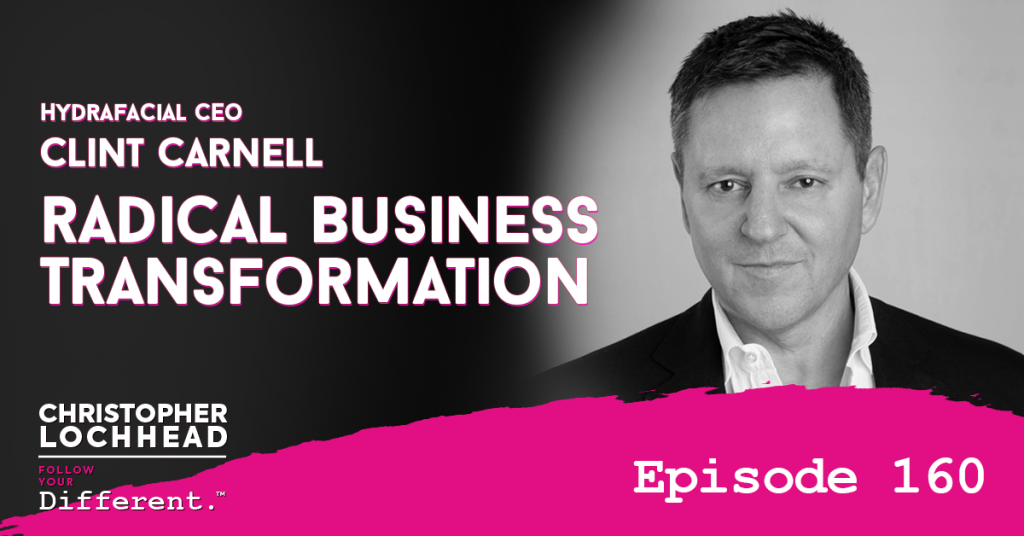
Podcast: Play in new window | Download (Duration: 56:41 — 38.9MB) | Embed
Subscribe: Apple Podcasts | Spotify | Pandora | RSS | More
Today, we have Clint Carnall, CEO of HydraFacial to share an extraordinary story of resilience, creativity, and action in a very short period of time. Clint’s company was one of the many companies that were amassing tens of millions of dollars in revenue, pre-pandemic. Now at zero revenues, they opted to go radically generous and thoughtfully aggressive.
This is a legendary and inspiring example of how an entrepreneurial team scaled to meet any challenge, even the greatest challenge frankly that any of us have faced in our lifetime.
The HydraFacial Ecosystem
HydraFacial, as Christopher described it “is a company that is a part medical procedure, part beauty spa-like experience.” Clint, on the other hand, describes their company as a company built on “partnership.” They are not a “or” company, rather an “and” company, considering hotels, spas, medical physicians as partners rather than competitors.
“Absolutely, no matter how good the painter they are, everybody needs a clean canvas. They think about HydraFacial like giving these physician med spas a clean canvas.” – Clint Carnell
Clint continues to describe how their company operates in an ecosystem of physicians and nurses and consumers spas, hotels, etc and how this business model helped them to drastically grow the business.
From Top-Tier to Zero Revenues
A few weeks ago, Clint’s company HydraFacial were on a growth tier, serving different regions worldwide. They were on their A-game until Covid-19 struck their business. Clint shares how he witnessed their markets in China, Japan, Taiwan, and the rest of the world shut down.
However, Clint shares why this is an exciting time to be creative and to brush it off and take off.
“I say it is a creative time. You know, it feels like an ambush. You are walking along and things are fine and then something hits you out of nowhere that you couldn’t expect. We are a little stunned. We have to brush ourselves off, were up and back, and ready to go.” – Clint Carnell
Finding Opportunities Amidst Crisis
Clint believes that good companies and executives, as well as creative entrepreneurs, have the capacity to make today as ‘creative times.’ CEOs all over the world have to make hard decisions, especially when you go from that kind of growth to almost zero revenue overnight.
“The things that made us good executing the way up were the same things that are serving us during these challenging times and so strategy, but more importantly, solid execution.” – Clint Carnell
To hear more about how a category queen company created three new lines of business in a matter of weeks after their core category collapsed to no fault of their own and for more information about Clint, download and listen to this episode.
Bio:
Clint was born in Anchorage Alaska but receives no royalties from the pipeline, thus he works for a living as our Chief Executive Officer.
He grew up in Washington State and chased a soccer ball well enough to attend Duke University on a scholarship where he received grades good enough to land jobs with the likes of Johnson & Johnson, Chiron, Gambro Healthcare and Bausch & Lomb.
He’s always been an entrepreneur starting in his early days when he would skip the school bus, buy jolly ranchers for a nickel and sell them for a quarter.
At thirty, he founded Charleston Renal Care, which was acquired by DaVita.
This gave him the ability to take a chance and join a VC backed company named Thermage, which went public, made acquisitions, and is now called Solta Medical.
In his very spare time, Clint and his wife are busy raising two kids in Park City, Utah. The family has lots of animals affectionately called “the farm”. His biggest fear is breaking all his bones trying to race his kids down the ski slope!
Links:
We hope you enjoyed this episode of Follow Your Different™! Christopher loves hearing from his listeners. Feel free to email him, connect on Facebook, Twitter, Instagram and subscribe on iTunes!
157 How AI Can Work For Everyone w/ Girl Decoded Author, Rana el Kaliouby
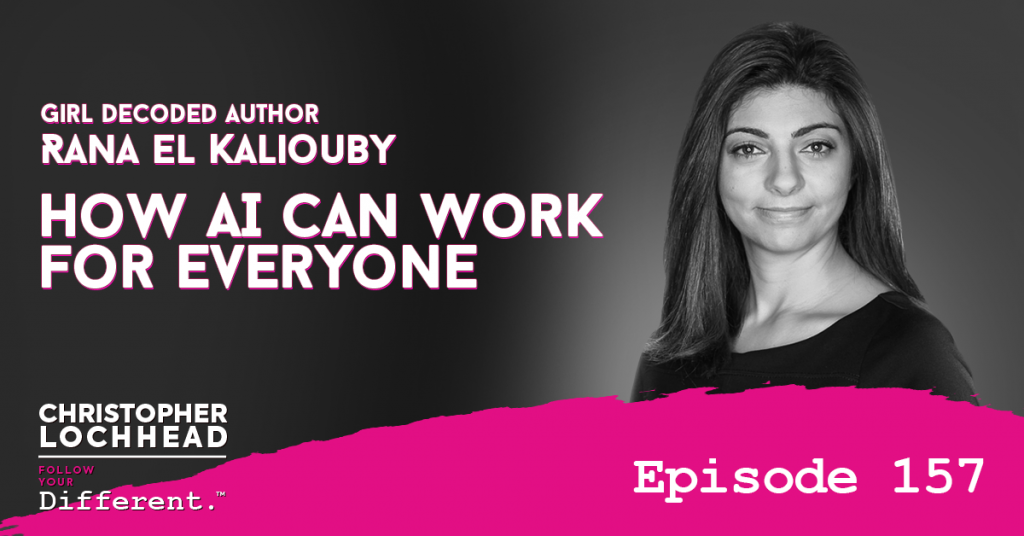
Podcast: Play in new window | Download (Duration: 1:15:25 — 51.8MB) | Embed
Subscribe: Apple Podcasts | Spotify | Pandora | RSS | More
Today, we have a riveting conversation with Dr. Rana el Kaliouby. She’s a tech / AI entrepreneur and the author of a brand new book out called Girl Decoded. Rana is the co-founder and CEO of Affectiva. Her work on A.I. is bleeding edge, particularly around human and emotional AI and the ethics of AI and more. This is a stunning, inspiring, real dialogue that you’ll surely love.
Top Woman in Tech
Rana el Kaliouby is a Muslim woman kicking butt in the American tech entrepreneur world. She holds a Ph.D. from the University of Cambridge and a Post Doctorate at MIT. She’s one of Fortune’s 40 Under 40 and Forbes says she’s one of America’s Top 50 Women in Tech.
She describes her success as a privilege for having supportive parents who made sure she and her siblings get a top-notch education.
“I grew up surrounded by strong women but it was always understood that your priority is the family and you do your work on the side, that was the context.” – Rana el Kaliouby
EI and AI, Counterintuitive
Christopher asks about how Rana speaks about Emotional intelligence in the AI world as it is oftentimes, counterintuitive. Rana shares how her endeavors connected the two.
“Even 25 years ago, I saw this pattern, with tech, it empowers us to communicate with more people. But I always felt there was something missing. We were communicating with more and more people so the quantity is there but the quality of the connection wasn’t quite there. It was almost like an illusion of a connection. – Rana el Kaliouby
Rana shares about her first time living abroad. She was newly married at the time and she found herself away from her family and then-husband who had to stay behind to run a software company. She realized that despite spending a lot of time with her laptop and mobile phone, she always felt alone due to a lack of intimacy of technology.
Importance of Emotional Intelligence
During Rana’s study abroad, technology served as the main portal of communication between her and her family. However, it fails to communicate the richness of her voice, intonation, facial expressions, and gestures. Non-verbal communications are lost she was chatting over text with her family.
“That just got me thinking, emotional intelligence and our emotions, in general, are so important in how we live our lives, how we make decisions, how we connect with one another, how we learn, how our memory gets encoded yet, in the digital universe, its devoid of all of that. That set me on the path of building technology that has AI and emotional intelligence and maybe even someday, empathy.” – Rana el Kaliouby
To hear more about Rana ’s views on human and emotional AI and the ethics of AI, download and listen to this episode.
Bio:
Rana is co-founder and CEO of Affectiva.
Having defined the category of Emotion AI, Rana is now pioneering Human Perception AI: technology that can understand all things human.
A passionate advocate for innovation, ethics in AI and diversity, Rana has been recognized on
Fortune’s 40 Under 40 and Forbes America’s Top 50 Women in Tech.
Rana is a World Economic Forum Young Global Leader.
She holds a PhD from the University of Cambridge and a Post Doctorate at MIT.
Links:
We hope you enjoyed this episode of Follow Your Different™! Christopher loves hearing from his listeners. Feel free to email him, connect on Facebook, Twitter, Instagram, and subscribe on iTunes!
156 Samsung Rising: Geoffrey Cain, Bestselling Author
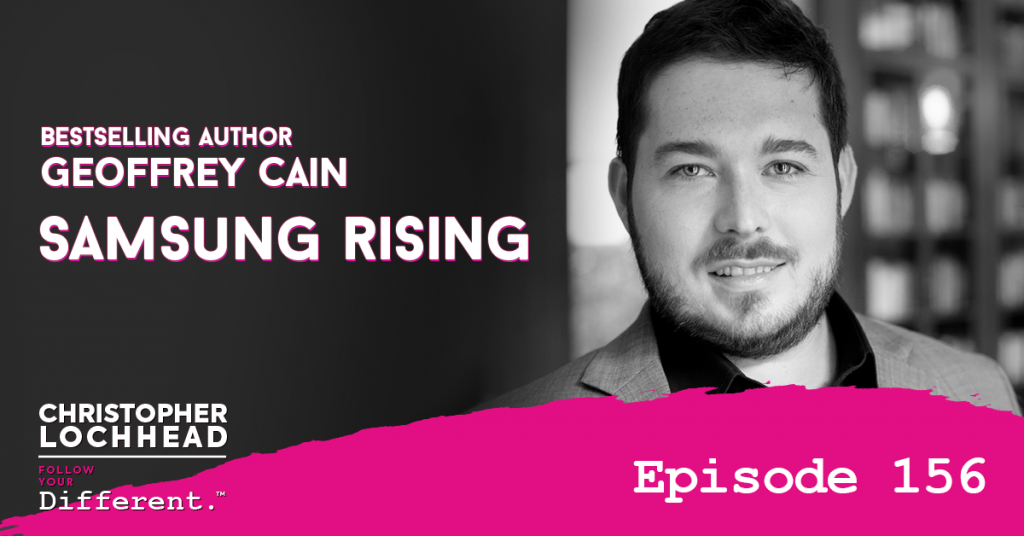
Podcast: Play in new window | Download (Duration: 1:53:29 — 77.9MB) | Embed
Subscribe: Apple Podcasts | Spotify | Pandora | RSS | More
We continue our run of legendary authors with best selling author of the brand new book Samsung Rising, Geoffrey Cain. He takes us into both South and North Korea, what it’s like to live in both places and how relatively small South Korea gained out-sized economic power. We also talk about how Samsung grew from a fish market to a mega-empirical, multi-national, with 300,000 employees. There’s a ton here you’ll find fascinating.
South Korea
Geoffrey gives a great visual description of both North and South Korea in this episode. He lived on and off in South Korea from 2009 to 2016 and have visited North Korea as well for two weeks as a reporter.
He further describes how South Koreans practice their right to assemble to petition about issues such as powers of major corporations, labor unions, and the like. He relates South Korea to the French who have massive protests, too.
“Korean democracy is quite young, it was only 1987 that Korea became a democracy. It wasn’t until many years later that it really became a full democracy. It was a corrupted democracy for a long time. The fascinating thing was the fact that I’m standing in the Square, and I could turn north and look north and I would realize that about 45 minutes or an hour drive away from me, is the border of North Korea.” – Geoffrey Cain
North Korea
On the border of South Korea lies what they call the DMZ or the Demilitarized Zone. It is one of the most heavily mined places on Earth. Former President Bill Clinton even visited and said: “its the scariest place on Earth.”
South Korea (SK) is described as orderly but with bustling cars and noise, he describes the DMZ in North Korea as barren land. There were no lush trees like in SK and the whole vibe of Pyongyang, the capital was similar to a dystopian sci-fi movie.
Miracle in Han River
The unexpected growth of South Korea is often called as the Miracle in Han River. The country was able to come out of nowhere and take on the world. This is what Geoffrey discussed in his book Samsung Rising.
“The story of this nation that has been overlooked in the past—it is small, it is seen as inconsequential, it is this little peninsula next to this major giant, China, smash right there with Japan, which is also a big power subject to all kinds of war and sufferings in the past—but somehow managed to become this powerhouse of technology and economy and industry and democracy.” – Geoffrey Cain
To hear more about Geoffrey’s views on China and Asia more broadly, the Coronavirus and the battle for worldwide AI supremacy, download and listen to this episode.
Bio:
Geoffrey Cain is an award-winning foreign correspondent, author, commentator, anthropologist, and scholar of East and Central Asia.
His first book, Samsung Rising: The Inside Story of the South Korea Giant That Set Out to Beat Apple and Conquer Tech, from a decade of his coverage of the world’s largest technology conglomerate, was published in March 2020 by Currency at Penguin Random House.
A former correspondent at The Economist, Cain is a regular commentator in The Wall Street Journal, Time, Foreign Policy,
The New Republic and The Nation, and a frequent guest on CNN, MSNBC, BBC and Bloomberg.
Cain writes about the ways that technology is upending our lives, communities, governments and businesses.
His work takes him to the world’s most authoritarian and far-off places, from inside North Korea to the trans-Siberian railway across Russia, from investigations into genocide in Cambodia to experiments in technological surveillance in China.
Cain is sought out as a consultant on government, business and technology, having advised the World Health Organization, Open Government Partnership, the United Nations humanitarian affairs office, and major multinational corporations and investment firms.
A Fulbright scholar, he holds a master’s with distinction from London’s School of Oriental and African Studies and a bachelor’s at The George Washington University, which he attended on a music scholarship.
He is a term member of the Council on Foreign Relations and a security fellow at the Truman National Security Project.
Born in Los Angeles and raised in Chicago, Cain lives in Istanbul, Turkey, and Washington, DC. He plays the jazz trombone.
Links:
The NY Times: Samsung: The Tech Monster That Conquered the World
We hope you enjoyed this episode of Follow Your Different™! Christopher loves hearing from his listeners. Feel free to email him, connect on Facebook, Twitter, Instagram and subscribe on iTunes!

